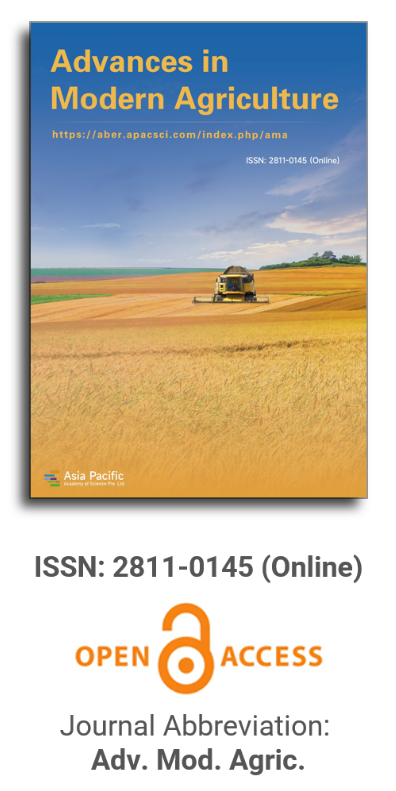


Agriculture, sustainable development, environment, farmer knowledge and universities
Vol 3, Issue 2, 2022
VIEWS - 6621 (Abstract)
Download PDF
Abstract
Society still faces serious environmental and socioeconomic problems, which have only been partially offset by the rapid development of knowledge, information technology, and technology; however, sustainable development remains a goal. This article aims to establish a debate on the contribution of agriculture to sustainable development and to analyze the role of the university in this process. Different alternatives to agricultural production that can contribute to sustainability are critically reviewed. These include good agricultural practices that seek to preserve the environment, including agroecology and organic agriculture, precision agriculture, and some applications of biotechnology. There is currently a need to establish evaluation methods that allow objective identification of progress or setbacks in the quest for sustainability. In the implementation of the concept of sustainable agriculture, universities have an essential role to play as the main source of scientific truth and center of knowledge, without detracting from the legitimacy and value of other epistemic systems such as peasant, traditional, or local knowledge.
Keywords
References
- United Nations Development Programme (UNDP). Human Development Report 2002. Deepening Democracy in a Fragmented World. Oxford University Press; 2002.
- Food and Agriculture Organization of the United Nations (FAO). Action Plan. Latin America and the Caribbean without Hunger Initiative (Spanish). Regional Office for Latin America and the Caribbean; 2007.
- Leiva FR. Sustainability of agricultural systems (Spanish). Colombian Agronomy 1998; 15(2–3): 181–193.
- Müller B. Montreal 2005. What Happened, and What It Means. Oxford Institute for Energy Studies; 2006.
- Jehan S, Umana A. The environment-poverty nexus. Development Policy Journal 2003; 3(20): 53–70.
- Organisation for Economic Co-operation and Development (OECD). Environmental Outlook. OECD; 2001.
- Lal R. Carbon emission from farm operations. Environment International 2004; 30(7): 981–990. doi: 10.1016/j.envint.2004.03.005
- Turner RK. Sustainability principles and practice. In: Sustainable Environmental Economics and Management Principles and Practice. Wiley; 1995. pp. 3–36.
- Food and Agriculture Organization of the United Nations (FAO). Good Agricultural Practices (Spanish). FAO, Regional Office for Latin America and the Caribbean; 2004.
- Altieri MA, Nicholls CI. Agroecology and the Search for a Truly Sustainable Agriculture. United Nations Environment Programme; 2005.
- Kirchmann H, Thorvaldsson G. Challenging targets for future agriculture. European Journal of Agronomy 2000; 12(3–4): 145–161. doi: 10.1016/S1161-0301(99)00053-2
- Pretty JN, Morison JIL, Hine RE. Reducing food poverty by increasing agricultural sustainability in developing countries. Agriculture, Ecosystems & Environment 2003; 95(1): 217–234. doi: 10.1016/S0167-8809(02)00087-7
- Blackmore S. Precision farming: An introduction. Outlook on Agriculture 1994; 23(4): 275–280. doi: 10.1177/003072709402300407
- Godwin RJ, Wood GA, Taylor JC, et al. Precision farming of cereal crops: A review of a six year experiment to develop management guidelines. Biosystems Engineering 2003; 84(4): 375–391. doi: 10.1016/S1537-5110(03)00031-X
- Auernhammer H. Precision farming—The environmental challenge. Computers and Electronics in Agriculture 2001; 30(1–3): 31–43. doi: 10.1016/S0168-1699(00)00153-8
- Leiva FR. Methodological approach to site-specific soil management for the sustainability and competitiveness of transitional crops in Colombia (Spanish). Suelos Ecuatoriales 2006; 36(2): 49–56.
- Zhang N, Wang M, Wang N. Precision agriculture—A worldwide overview. Computers and Electronics in Agriculture 2002; 36(2–3): 113–132. doi: 10.1016/S0168-1699(02)00096-0
- Leiva FR, Morris J, Blackmore SB. Precision farming techniques for sustainable agriculture. Papers presented at the First European Conference on Precision Agriculture; 7–10 September 1997; Coventry, UK.
- König A, Cockburn A, Crevel RWR, et al. Assessment of the safety of foods derived from genetically modified (GM) crops. Food and Chemical Toxicology 2004; 42(7): 1047–1088. doi: 10.1016/j.fct.2004.02.019
- Leiva FR, Villalobos RR. Systems Sustainability Assessment Cold Climate Agriculture: Case of Potato (Solanum Tuberosum) (Spanish). Unibiblos; 2007.
- Harrington L, Jones PG, Winograd. Measurements and Indicators of Sustainability. CIAT; 1993.
- Gallopín G. Sustainability and Sustainable Development (Spanish). United Nations; 2003.
Supporting Agencies
Copyright (c) 2022 Mirela Rizo-Mustelier, Daniel Rafael Vuelta-Lorenzo, Ana María Lorenzo-García

This work is licensed under a Creative Commons Attribution 4.0 International License.

This site is licensed under a Creative Commons Attribution 4.0 International License (CC BY 4.0).

Prof. Zhengjun Qiu
Zhejiang University, China

Cheng Sun
Academician of World Academy of Productivity Science; Executive Chairman, World Confederation of Productivity Science China Chapter, China
Indexing & Archiving
In the realm of modern agriculture, the integration of cutting-edge technologies is revolutionizing the way we approach sustainable farming practices. A recent study published in Advances in Modern Agriculture titled "Classification of cotton water stress using convolutional neural networks and UAV-based RGB imagery" has garnered significant attention for its innovative approach to precision irrigation management. Conducted by researchers from Institute of Data Science and the AgriLife Research and Extension Center of Texas A&M University (authors's information is below). This study introduces a novel method for classifying cotton water stress using unmanned aerial vehicles (UAVs) and convolutional neural networks (CNNs), offering a powerful solution for optimizing water use in agriculture.
Modern agricultural technology is evolving rapidly, with scientists collaborating with leading agricultural enterprises to develop intelligent management practices. These practices utilize advanced systems that provide tailored fertilization and treatment options for large-scale land management.
This journal values human initiative and intelligence, and the employment of AI technologies to write papers that replace the human mind is expressly prohibited. When there is a suspicious submission that uses AI tools to quickly piece together and generate research results, the editorial board of the journal will reject the article, and all journals under the publisher's umbrella will prohibit all authors from submitting their articles.
Readers and authors are asked to exercise caution and strictly adhere to the journal's policy regarding the usage of Artificial Intelligence Generated Content (AIGC) tools.
Asia Pacific Academy of Science Pte. Ltd. (APACSCI) specializes in international journal publishing. APACSCI adopts the open access publishing model and provides an important communication bridge for academic groups whose interest fields include engineering, technology, medicine, computer, mathematics, agriculture and forestry, and environment.



.jpg)
.jpg)

.jpg)
